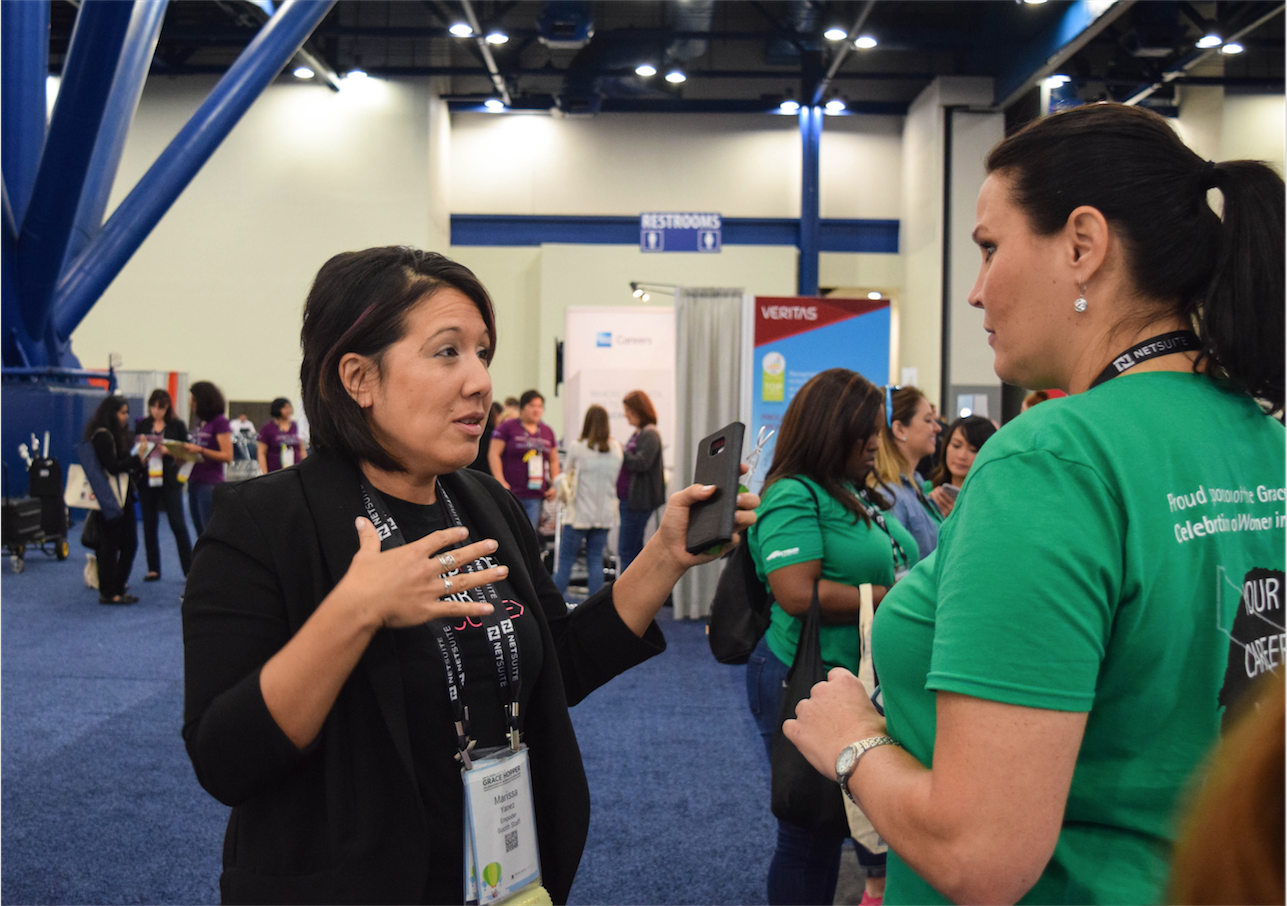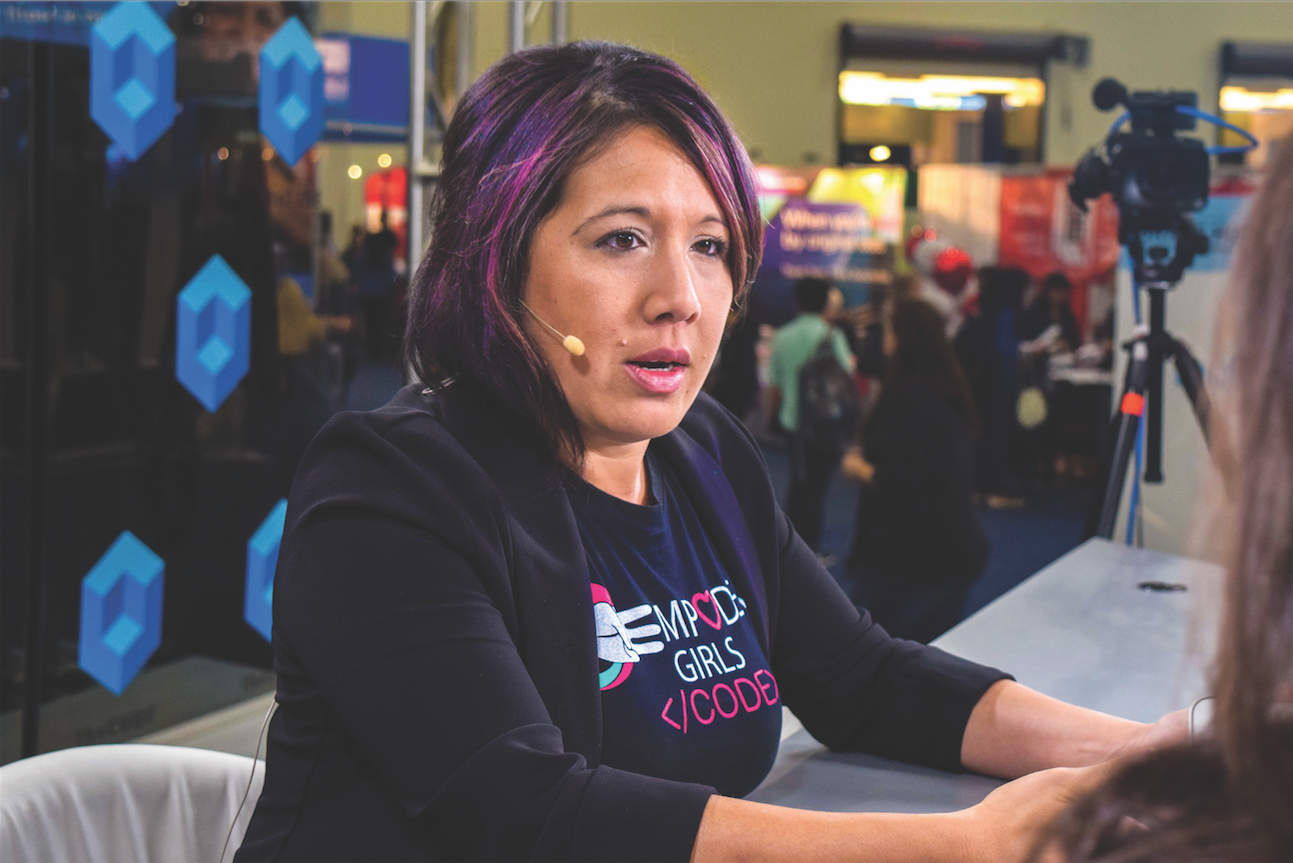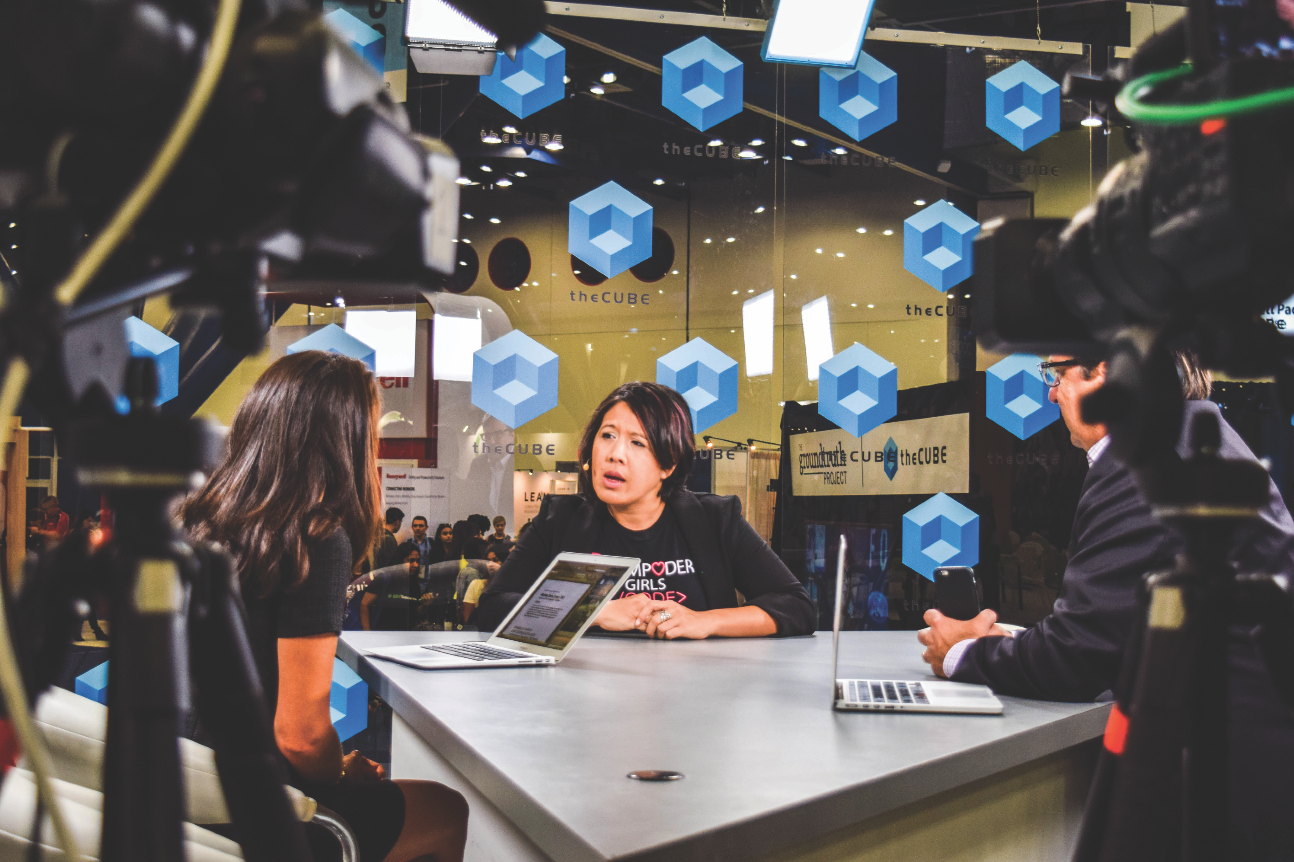At the Grace Hopper Celebration of Women in Computing in Houston, uniformed recruiters from top-level tech companies like Twitter, Facebook and Apple converse with eager students and recent grads about their company policies. Marissa Yanez, however, is not part of this demographic of keen job-seekers.
She jumps from booth to booth to explain her non-profit, Empoder, to reps, hoping that she can establish partnerships with the other .
As she talks, her hands seem to tactically move within the air, almost as if they have a mind of their own. She has described her organization to strangers hundreds of times, yet each time she speaks the same story — a story about inclusion, connection and most importantly, an often neglected demographic.
Yanez is the founder and CEO of Empoder, a nonprofit that teaches low-income Latina girls in Mountain View and East Palo Alto how to code. Empoder, a Spanish word that translates to “empower,” aims to play a role in strengthening local disadvantaged communities.
“I say community because we work with students, but it’s really a holistic process,” Yanez says. “To make systemic change with young students who are in middle school or even elementary school, you have to make change within their families, make change with their parents, make changes within the community.”
Community change is not easy. According to KQED, the average income in the top 20 percent of Bay Area households is $263,000 greater than the bottom 20 percent, an income gap 50 percent higher than the national average. The communities that Yanez aims to empower through computer science are poor, and live miles away from some of the richest people in the country. To Yanez, this income inequality is intimately intertwined with the educational gap between neighboring cities.
While the conference had plenty of representation from Silicon Valley, Yanez was the one of the only attendees who had worked in East Palo Alto. She promoted her cause through networking with some of the most powerful women in the tech industry, who are now more aware of low-income communities in the Bay Area. Now she is back home and has plans to expand Empoder to Palo Alto High School and the greater Palo Alto area.
A Latina connection
Yanez takes two business cards out of her pocket, one with a picture of the Latina girls she teaches, and the other with a picture of her and Susan Wojcicki, CEO of Youtube, and asks which one I like more. I choose the card with Susan.
“That’s funny. Most Latinas like the other one, because they can connect with these girls,” she says with a light-hearted laugh. “Most techies like the one with Susan.”
It’s clear that Yanez has a unique bond with her students from the picture in her hand, who she calls, “her girls.” In the picture, Yanez is surrounded by a group of girls attending one of Empoder’s summer programs, the group smiling widely and their arms wrapped around each other in tight embraces.
To Yanez, this connection between Latinas is one of the many reasons why Empoder is so successful at keeping girls engaged in computer science and engineering. Growing up in Los Altos, and attending Los Altos High School, Yanez has grown up in the exact community that she aims to serve. After working in the public sector in D.C., Yanez felt disconnected to her Latina community, which ultimately prompted her to come back to the Bay Area.
“I identify really well with Latinas,” Yanez says. “I know who they are, who they go home to, their culture.”
How girls learn
The cornerstone of Yanez’s organization hinges on getting Latina girls engaged. Yanez claims that if her girls develop apps and websites that are applicable in their lives, then they are more likely to stay engaged and pursue computer science at the college and career level.

“Study after study has shown that girls want to be in a field that they feel they can make a difference,” Yanez says. “They may not understand how creating technology or doing computer science makes a societal impact. That’s one of the first things we teach in our programs is like how can you empower yourself and your community through computer science.”
Yanez’s students designed an app that allows users to receive online homework help through a matching algorithm which pairs the needs of students with people with the skills and time. The app’s inception came out of her students’ need for homework help, particularly because many of their parents work after school. One of Yanez’s students also created an online forum for girls who often have to move because of lack of affordable housing. The users on the website can tell their stories of how moving has affected their life at home and how it’s disrupted their ability to concentrate in school.
“This whole notion that you have to use fashion and sewing and whatever to appeal to girls, I don’t buy it because it hasn’t been my experience,” Yanez says. “A lot of girls are into the societal responsibility aspect of tech.”
Mending the gap
Yanez started Empoder in 2014 in Puebla, Mexico, where she taught 25 boys and girls how to code with computers provided by a local university. In 2015, she realized the importance of having programs specifically for girls so that they can explore the world of technology that is so often overlooked, and opened a program in East Palo Alto in the Ravenswood school district.
Since then, the program has extended to Mountain View and Los Altos schools, teaching 100 girls in year-round and summer programs. The success of the program is partly due to Yanez’s philosophy of mending the educational gap of Silicon Valley — Yanez employs high school students who take AP Computer Science and volunteers who work in the tech industry to teach the girls.
“It’s so important to connect both sides of Silicon Valley because the kids who take AP computer science, they’re not your low income kids; they’re the other side of Silicon Valley,” Yanez says. “There really isn’t any other organization out there right now that is connecting the two sides of Silicon Valley that are so polarized.”
However, this gap extends beyond just wealth and gender — Yanez addressed the racial gap within the Silicon Valley tech industry, which is mostly dominated by white and Asian men. According to CNN, in 2015, Hispanic people made up approximately 3.2 percent of tech jobs in Silicon Valley and African Americans made up approximately 2.9 percent of tech jobs.
In fact, Yanez recalls a conference that she attended in which every attendee was talking about how much progress there has been for women in computer science; however, Yanez and the 10 Latina girls she brought were the only girls of color present.

“This whole project is about bringing underrepresented minority groups in Silicon Valley to light,” Yanez says. She has done just that — Empoder has impacted girls since its start and has connected with local churches and schools to make systemic change, making sure that Latinas have a seat at the table. This representation is vital simply because if Latina coders aren’t involved in making technology, the technology won’t address their needs.
“If the majority of biotech is being created by white males, that’s why the majority of pharmaceuticals that are out there address diseases that affect white males instead of females or people from Africa or Latin America. What’s important to them [white males] is not necessarily what is important to females or to minorities,” Yanez says.
A Palo Alto future
With dozens of new connections from the conference under her belt, Yanez is prepared to take Empoder to Palo Alto.
The success that has lead her to expand has been due to Yanez’s unique ability to understand the dynamics of where her students come from. She is passionate, hardworking and works with the future of Silicon Valley everyday.
“I don’t want to be cocky, but I’m really good at this,” Yanez claims with a grin. “I’m really good at my job.”





